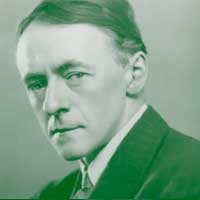Arnold Bax Biography - A Very Quick Guide
Artist:
Arnold Bax
Born:
8 November 1883, Streatham, Surrey
Died:
3 October 1953, Cork, Ireland
Arnold Edward Trevor Bax was an English composer, poet, and critic, remembered for his richly orchestrated music steeped in romanticism, Celtic myth, and the atmosphere of nature. He was born on November 8, 1883, in Streatham, London, into a wealthy family that enabled him to pursue a life dedicated to the arts.
Bax studied at the Royal Academy of Music from 1900, where he was taught by Frederick Corder and became fascinated by Wagner, Strauss, and the Russian composers (especially Balakirev and Rimsky-Korsakov). Equally transformative was his discovery of Irish and Celtic culture - through literature, poetry, and visits to Ireland - that would shape much of his music’s subject matter and tone. He even wrote poetry and prose under the pseudonym Dermot O’Byrne.
His music is characterized by lush harmonies, impressionistic textures, and sweeping orchestration, often evoking landscapes, legends, and personal emotions. Among his important works are:
Tone Poems: including Tintagel (1917–19), his most famous, inspired by the Cornish coast, as well as The Garden of Fand (1913–16) and November Woods (1917), works rich with atmosphere and mythic resonance.
Seven Symphonies (1921–39): A monumental cycle reflecting his development from post-Romantic expansiveness to a darker, more austere style in the interwar years.
Concertos and chamber music: such as his Violin Concerto (1938), Piano Quintet (1915), and numerous sonatas and quartets.
Choral works: including settings of Irish poetry and the grand Mater ora filium (1921).
In 1942, Bax was appointed Master of the King’s Music, a largely ceremonial position that required him to compose occasional pieces for royal events. Though this role gave him prestige, his creative energies had already peaked, and he wrote relatively little in his later years.
Bax’s personal life was complex. Though married, he maintained a long relationship with pianist Harriet Cohen, who championed his piano works. His aristocratic, bohemian lifestyle and love of remote landscapes - Cornwall, Ireland, and Scotland—were central to his artistic identity.
Sir Arnold Bax died on October 3, 1953, while holidaying in Cork, Ireland. He was buried in St Fin Barre’s Cathedral, Cork.
Today, Bax is remembered as one of the last great figures of English late-Romanticism: a composer who resisted the pull of modernism, instead creating music of sensuous orchestral colour and deep personal poetry, rooted in myth, memory, and landscape.
Bax studied at the Royal Academy of Music from 1900, where he was taught by Frederick Corder and became fascinated by Wagner, Strauss, and the Russian composers (especially Balakirev and Rimsky-Korsakov). Equally transformative was his discovery of Irish and Celtic culture - through literature, poetry, and visits to Ireland - that would shape much of his music’s subject matter and tone. He even wrote poetry and prose under the pseudonym Dermot O’Byrne.
His music is characterized by lush harmonies, impressionistic textures, and sweeping orchestration, often evoking landscapes, legends, and personal emotions. Among his important works are:
Tone Poems: including Tintagel (1917–19), his most famous, inspired by the Cornish coast, as well as The Garden of Fand (1913–16) and November Woods (1917), works rich with atmosphere and mythic resonance.
Seven Symphonies (1921–39): A monumental cycle reflecting his development from post-Romantic expansiveness to a darker, more austere style in the interwar years.
Concertos and chamber music: such as his Violin Concerto (1938), Piano Quintet (1915), and numerous sonatas and quartets.
Choral works: including settings of Irish poetry and the grand Mater ora filium (1921).
In 1942, Bax was appointed Master of the King’s Music, a largely ceremonial position that required him to compose occasional pieces for royal events. Though this role gave him prestige, his creative energies had already peaked, and he wrote relatively little in his later years.
Bax’s personal life was complex. Though married, he maintained a long relationship with pianist Harriet Cohen, who championed his piano works. His aristocratic, bohemian lifestyle and love of remote landscapes - Cornwall, Ireland, and Scotland—were central to his artistic identity.
Sir Arnold Bax died on October 3, 1953, while holidaying in Cork, Ireland. He was buried in St Fin Barre’s Cathedral, Cork.
Today, Bax is remembered as one of the last great figures of English late-Romanticism: a composer who resisted the pull of modernism, instead creating music of sensuous orchestral colour and deep personal poetry, rooted in myth, memory, and landscape.
Top Pieces on 8notes by Arnold Bax
